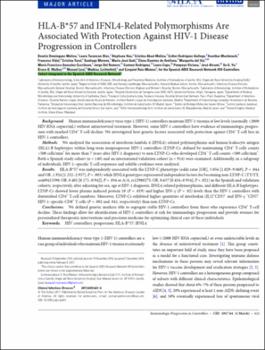HLA-B*57 and IFNL4-Related Polymorphisms Are Associated With Protection Against HIV-1 Disease Progression in Controllers.
Fecha
2016Resumen
Background. Human immunodeficiency virus type 1 (HIV-1) controllers maintain HIV-1 viremia at low levels (normally <2000
HIV-RNA copies/mL) without antiretroviral treatment. However, some HIV-1 controllers have evidence of immunologic progression with marked CD4+
T-cell decline. We investigated host genetic factors associated with protection against CD4+
T-cell loss in
HIV-1 controllers.
Methods. We analyzed the association of interferon-lambda 4 (IFNL4)–related polymorphisms and human leukocyte antigen
(HLA)-B haplotypes within long-term nonprogressor HIV-1 controllers (LTNP-Cs; defined by maintaining CD4+
T-cells counts
>500 cells/mm3
for more than 7 years after HIV-1 diagnosis) vs non-LTNP-Cs who developed CD4+
T-cell counts <500 cells/mm3
.
Both a Spanish study cohort (n = 140) and an international validation cohort (n = 914) were examined. Additionally, in a subgroup
of individuals, HIV-1–specific T-cell responses and soluble cytokines were analyzed.
Results. HLA-B*57 was independently associated with the LTNP-C phenotype (odds ratio [OR], 3.056 [1.029–9.069]; P = .044
and OR, 1.924 [1.252–2.957]; P = .003) while IFNL4 genotypes represented independent factors for becoming non-LTNP-C (TT/TT,
ss469415590; OR, 0.401 [0.171–0.942]; P = .036 or A/A, rs12980275; OR, 0.637 [0.434–0.934]; P = .021) in the Spanish and validation
cohorts, respectively, after adjusting for sex, age at HIV-1 diagnosis, IFNL4-related polymorphisms, and different HLA-B haplotypes.
LTNP-Cs showed lower plasma induced protein 10 (P = .019) and higher IFN-γ (P = .02) levels than the HIV-1 controllers with
diminished CD4+
T-cell numbers. Moreover, LTNP-Cs exhibited higher quantities of interleukin (IL)2+
CD57-
and IFN-γ +
CD57-
HIV-1–specific CD8+
T cells (P = .002 and .041, respectively) than non-LTNP-Cs.
Conclusions. We defined genetic markers able to segregate stable HIV-1 controllers from those who experience CD4+
T-cell
decline. These findings allow for identification of HIV-1 controllers at risk for immunologic progression and provide avenues for
personalized therapeutic interventions and precision medicine for optimizing clinical care of these individuals.






